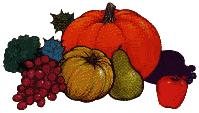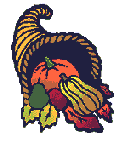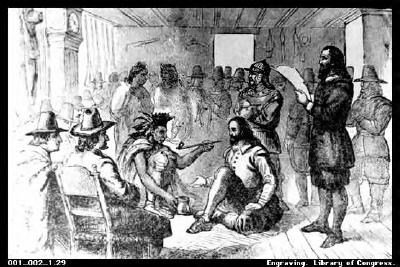|
 Did you
know that the story of Thanksgiving and the National Holiday were not created until 1863, by Pres. Lincoln, to
increase patriotism during the Civil War & that Pilgrims were not even included in the story until 1890?! That
was 240 years AFTER it supposedly took place! Did you
know that the story of Thanksgiving and the National Holiday were not created until 1863, by Pres. Lincoln, to
increase patriotism during the Civil War & that Pilgrims were not even included in the story until 1890?! That
was 240 years AFTER it supposedly took place!
Native Americans had observed autumnal harvest celebrations for centuries before that.
After the Europeans arrived, the Natives would sometimes include them in the feasts to forge alliances.

Squanto was taken to England before the Pilgrims ever landed. And was even sold as a slave? When he finally escaped
and made his way home, he discovered that his entire village had been wiped out by a plague, brought to the country
by the Europeans. He greeted the Pilgrims in English and was responsible for teaching them to survive in New England.
That the Native Americans had been practicing "slash and burn" farming years
before the arrival of the Europeans. Many towns, such as Springfield and Deerfield, were so named because of the
acres of crops in the fields.

In 1970, the Wampanoags were asked to select someone to give a speech in honor of the 350th anniversary of the
landing of the Mayflower. When Frank James submitted his speech, for review, it was rejected. Here is that speech:
"Today is a time of celebrating for you -- a time of looking back
to the first days of white people in
America. But it is not a time of celebrating for me. It is with a heavy heart that I look back upon
what happened to my People. When the Pilgrims arrived, we, the Wampanoags, welcomed them
with open arms, little knowing that it was the beginning of the end. That before 50 years were to
pass, the Wampanoag would no longer be a tribe. That we and other Indians living near the settlers
would be killed by their guns or dead from diseases that we caught from them. Let us always
remember, the Indian is and was just as human as the white people.
Although our way of life is almost gone, we, the Wampanoags, still walk the lands of
Massachusetts. What has happened cannot be changed. But today we work toward a better
America, a more Indian America where people and nature once again are important."

Learn More of the Truths about Thanksgiving
Not Just for Kids! A Thanksgiving Lesson Plan
http://www.night.net/thanksgiving/lesson-plan.html
The Children's Museum and Wampanoag Advisors jointly offer this website
to help educators
present the history of Wampanoag people with accuracy and respect
The Children's Museum
http://tc.bostonkids.org/
Information on both the Pilgrims and Native Americans
Plimoth-on-Web
http://www.plimoth.org/index.html
|


